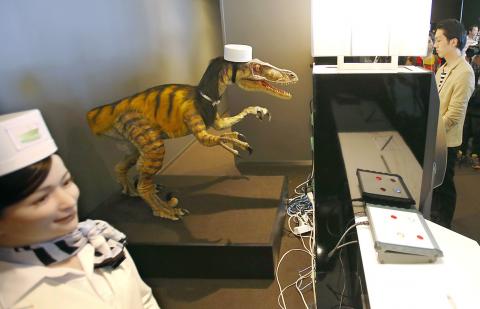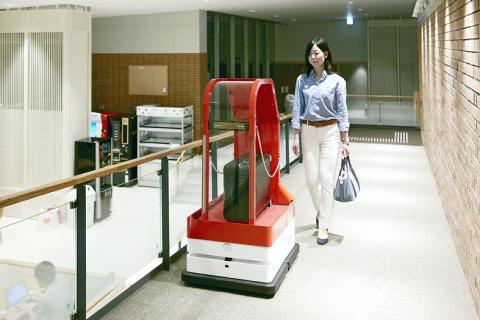The English-speaking receptionist is a vicious-looking dinosaur, and the one speaking Japanese is a female humanoid with blinking lashes.
“If you want to check in, push one,” the dinosaur says.
The visitor punches a button on the desk, and types in information on a touch panel screen.

Photo: AP
From the front desk to the porter, which is an automated trolley taking luggage up to the room, this hotel in southwestern Japan, aptly called Weird Hotel, is “manned” almost totally by robots to save labor costs.
Hideo Sawada, who runs the hotel as part of an amusement park, says using robots is not a gimmick, but a serious effort to utilize technology and achieve efficiency.
Henn-na Hotel, as it is called in Japanese, was shown to reporters on Wednesday, complete with robot demonstrations, ahead of its opening to the public on Friday.

Photo: EPA
Another feature of the hotel is the use of facial-recognition technology, instead of the standard electronic keys, by registering the digital image of the guest’s face during check-in.
The reason? Robots are not good at finding keys, if people happen to lose them.
A giant robotic arm, usually seen in manufacturing, is encased in glass quarters in the corner of the lobby. It lifts one of the boxes stacked into the wall and puts it out through a space in the glass, where a guest can place an item in it, to use as a locker.
The arm will put the box back into the wall, until the guest wants it again. The system is called “robot cloak room.”
Why a simple coin locker will not suffice is beside the point.
“I wanted to highlight innovation,” Sawada told reporters. “I also wanted to do something about hotel prices going up.”
Staying at Henn na Hotel starts at ¥9,000 (US$80), a bargain for Japan, where a stay in one of the nicer hotels can easily cost twice or three times that much.
The concierge is a doll-like hairless robot with voice recognition that prattles breakfast and event information. It cannot call a cab or do other errands.
Japan is a world leader in robotics technology, and the government is trumpeting robotics as a pillar of its growth strategy. Robots have long been used there in manufacturing. However, interest is also high in exploring the potential of robots in human interaction, including helping care for the elderly.
Robotics is also key in the decommissioning of the three reactors at the Fukushima Dai-ichi nuclear power plant, which went into meltdown in 2011, in the worst nuclear catastrophe since Chernobyl.
One area for which the Henn-na Hotel still relies on human beings is security.
The place is dotted with security cameras, and real people are watching everything through a monitor to make sure guests stay safe and no one makes off with one of the expensive robots.
“And they still can’t make beds,” said Sawada, who has also engineered the rise of a popular affordable Japanese travel agency.
He has big ambitions for his robot hotel concept and wants to open another one soon in Japan, and later abroad. He is also eager to add other languages, such as Chinese and Korean, to the robots’ vocabulary.
A block-shaped robot that was scuttling around in the lobby had been brought in to do room service, delivering beverages and simple snacks, but it was not ready to do that yet.
Outdoors, Sawada also demonstrated a drone that flew in to deliver a few small jars filled with snacks. He said he wanted to eventually have drones perform in shows for guests.
In the hotel’s rooms, a lamp-size robot in the shape of a fat pink tulip called Tuly answers simple questions like: “What time is it?” and “What is the weather tomorrow?”
You can also tell it to turn the room lights on or off. There are no switches on the walls.
Sawada is keeping the hotel half-filled for the first few weeks to make sure nothing goes wrong.
He also canceled at the last minute the overnight stay planned for media. The robots simply were not ready.

Nvidia Corp chief executive officer Jensen Huang (黃仁勳) on Monday introduced the company’s latest supercomputer platform, featuring six new chips made by Taiwan Semiconductor Manufacturing Co (TSMC, 台積電), saying that it is now “in full production.” “If Vera Rubin is going to be in time for this year, it must be in production by now, and so, today I can tell you that Vera Rubin is in full production,” Huang said during his keynote speech at CES in Las Vegas. The rollout of six concurrent chips for Vera Rubin — the company’s next-generation artificial intelligence (AI) computing platform — marks a strategic

REVENUE PERFORMANCE: Cloud and network products, and electronic components saw strong increases, while smart consumer electronics and computing products fell Hon Hai Precision Industry Co (鴻海精密) yesterday posted 26.51 percent quarterly growth in revenue for last quarter to NT$2.6 trillion (US$82.44 billion), the strongest on record for the period and above expectations, but the company forecast a slight revenue dip this quarter due to seasonal factors. On an annual basis, revenue last quarter grew 22.07 percent, the company said. Analysts on average estimated about NT$2.4 trillion increase. Hon Hai, which assembles servers for Nvidia Corp and iPhones for Apple Inc, is expanding its capacity in the US, adding artificial intelligence (AI) server production in Wisconsin and Texas, where it operates established campuses. This

US President Donald Trump on Friday blocked US photonics firm HieFo Corp’s US$3 million acquisition of assets in New Jersey-based aerospace and defense specialist Emcore Corp, citing national security and China-related concerns. In an order released by the White House, Trump said HieFo was “controlled by a citizen of the People’s Republic of China” and that its 2024 acquisition of Emcore’s businesses led the US president to believe that it might “take action that threatens to impair the national security of the United States.” The order did not name the person or detail Trump’s concerns. “The Transaction is hereby prohibited,”

Garment maker Makalot Industrial Co (聚陽) yesterday reported lower-than-expected fourth-quarter revenue of NT$7.93 billion (US$251.44 million), down 9.48 percent from NT$8.76 billion a year earlier. On a quarterly basis, revenue fell 10.83 percent from NT$8.89 billion, company data showed. The figure was also lower than market expectations of NT$8.05 billion, according to data compiled by Yuanta Securities Investment and Consulting Co (元大投顧), which had projected NT$8.22 billion. Makalot’s revenue this quarter would likely increase by a mid-teens percentage as the industry is entering its high season, Yuanta said. Overall, Makalot’s revenue last year totaled NT$34.43 billion, down 3.08 percent from its record NT$35.52